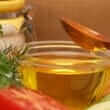Background
- Beta-sitosterol is one of the most common dietary phytosterols (plant sterols) found in and made exclusively by plants. Beta-sitosterol glucoside is a glucoside attached to beta-sitosterol. Other phytosterols include campesterol and stigmasterol. Stanols are saturated derivatives of sterols.
- Beta-sitosterol is classified as a noncholesterol sterol, or neutral sterol. However, it is structurally similar to cholesterol, and it is the main sterol in the Western diet. Some evidence suggests that Americans consume about 165 milligrams of beta-sitosterol daily. Beta-sitosterol and beta-sitosterol glucoside are found in the tissue, plasma, and feces of healthy individuals. The average content of plant sterols found in the plasma of healthy Western individuals is one milligram per deciliter.
- Beta-sitosterol is found in plant-based foods, such as fruits, vegetables, soybeans, breads, peanuts, and peanut products. Beta-sitosterol is also present in bourbon and oils, such as olive, flaxseed, and tuna. Plant oils contain the highest concentration of phytosterols. Nuts and seeds contain moderate amounts of phytosterols, while fruits and vegetables generally contain the lowest phytosterol concentrations. For example, roasted peanuts contain 61-114 milligrams per 100 grams, 78-83% of which is in the form of beta-sitosterol. Peanut butter contains 144-157 milligrams per 100 grams. These values indicate that peanut products are a good source of phytosterols, specifically, beta-sitosterol. Avocados have also been identified as a good source of beta-sitosterol. Beta-sitosterol can also be derived from pulp and paper mill effluents.
- Margarines enriched with phytosterol esters, including beta-sitosterol, have been marketed for their cholesterol-lowering effects. Sitosterols are also used in products for the treatment of other medical conditions, including, but not limited to, benign prostatic hyperplasia (BPH) and immune stimulation.
References
Natural Standard developed the above evidence-based information based on a thorough systematic review of the available scientific articles. For comprehensive information about alternative and complementary therapies on the professional level, go to . Selected references are listed below.
- Berges, R. R., Kassen, A., and Senge, T. Treatment of symptomatic benign prostatic hyperplasia with beta-sitosterol: an 18-month follow-up. BJU.Int. 2000;85(7):842-846.
View Abstract - Bouic, P. J., Clark, A., Brittle, W., Lamprecht, J. H., Freestone, M., and Liebenberg, R. W. Plant sterol/sterolin supplement use in a cohort of South African HIV-infected patients--effects on immunological and virological surrogate markers. S.Afr.Med.J 2001;91(10):848-850.
View Abstract - Bouic, P. J. and Lamprecht, J. H. Plant sterols and sterolins: a review of their immune-modulating properties. Altern.Med.Rev. 1999;4(3):170-177.
View Abstract - Charest, A., Desroches, S., Vanstone, C. A., Jones, P. J., and Lamarche, B. Unesterified plant sterols and stanols do not affect LDL electrophoretic characteristics in hypercholesterolemic subjects. J.Nutr. 2004;134(3):592-595.
View Abstract - Davidson, M. H., Maki, K. C., Umporowicz, D. M., Ingram, K. A., Dicklin, M. R., Schaefer, E., Lane, R. W., McNamara, J. R., Ribaya-Mercado, J. D., Perrone, G., Robins, S. J., and Franke, W. C. Safety and tolerability of esterified phytosterols administered in reduced-fat spread and salad dressing to healthy adult men and women. J Am Coll.Nutr. 2001;20(4):307-319.
View Abstract - Devaraj, S., Jialal, I., and Vega-Lopez, S. Plant sterol-fortified orange juice effectively lowers cholesterol levels in mildly hypercholesterolemic healthy individuals. Arterioscler.Thromb.Vasc.Biol. 2004;24(3):e25-e28.
View Abstract - Klippel, K. F., Hiltl, D. M., and Schipp, B. A multicentric, placebo-controlled, double-blind clinical trial of beta-sitosterol (phytosterol) for the treatment of benign prostatic hyperplasia. German BPH-Phyto Study group. Br.J Urol. 1997;80(3):427-432.
View Abstract - Lau, H. L., Puah, C. W., Choo, Y. M., Ma, A. N., and Chuah, C. H. Simultaneous quantification of free fatty acids, free sterols, squalene, and acylglycerol molecular species in palm oil by high-temperature gas chromatography--flame ionization detection. Lipids 2005;40(5):523-528.
View Abstract - Natural Standard: The Authority on Integrative Medicine.
- Nigon, F., Serfaty-Lacrosniere, C., Beucler, I., Chauvois, D., Neveu, C., Giral, P., Chapman, M. J., and Bruckert, E. Plant sterol-enriched margarine lowers plasma LDL in hyperlipidemic subjects with low cholesterol intake: effect of fibrate treatment. Clin.Chem Lab Med. 2001;39(7):634-640.
View Abstract - Prager, N., Bickett, K., French, N., and Marcovici, G. A randomized, double-blind, placebo-controlled trial to determine the effectiveness of botanically derived inhibitors of 5-alpha-reductase in the treatment of androgenetic alopecia. J Altern.Complement Med. 2002;8(2):143-152.
View Abstract - Tammi, A., Ronnemaa, T., Gylling, H., Rask-Nissila, L., Viikari, J., Tuominen, J., Pulkki, K., and Simell, O. Plant stanol ester margarine lowers serum total and low-density lipoprotein cholesterol concentrations of healthy children: the STRIP project. Special Turku Coronary Risk Factors Intervention Project. J Pediatr. 2000;136(4):503-510.
View Abstract - Thomsen, A. B., Hansen, H. B., Christiansen, C., Green, H., and Berger, A. Effect of free plant sterols in low-fat milk on serum lipid profile in hypercholesterolemic subjects. Eur.J.Clin.Nutr. 2004;58(6):860-870.
View Abstract - Varady, K. A., Ebine, N., Vanstone, C. A., Parsons, W. E., and Jones, P. J. Plant sterols and endurance training combine to favorably alter plasma lipid profiles in previously sedentary hypercholesterolemic adults after 8 wk. Am.J.Clin.Nutr. 2004;80(5):1159-1166.
View Abstract - Weststrate, J. A. and Meijer, G. W. Plant sterol-enriched margarines and reduction of plasma total- and LDL-cholesterol concentrations in normocholesterolaemic and mildly hypercholesterolaemic subjects. Eur.J Clin.Nutr. 1998;52(5):334-343.
View Abstract







